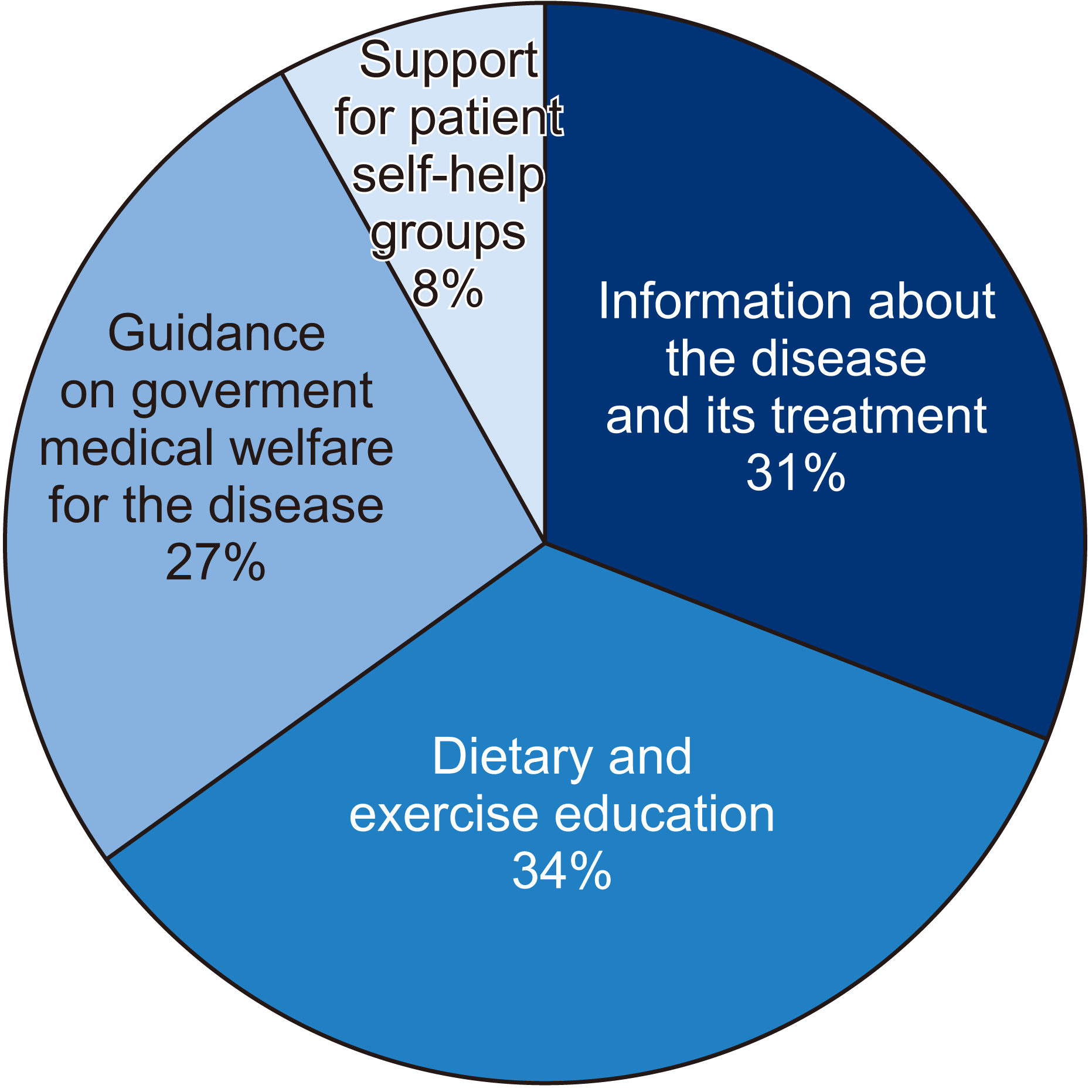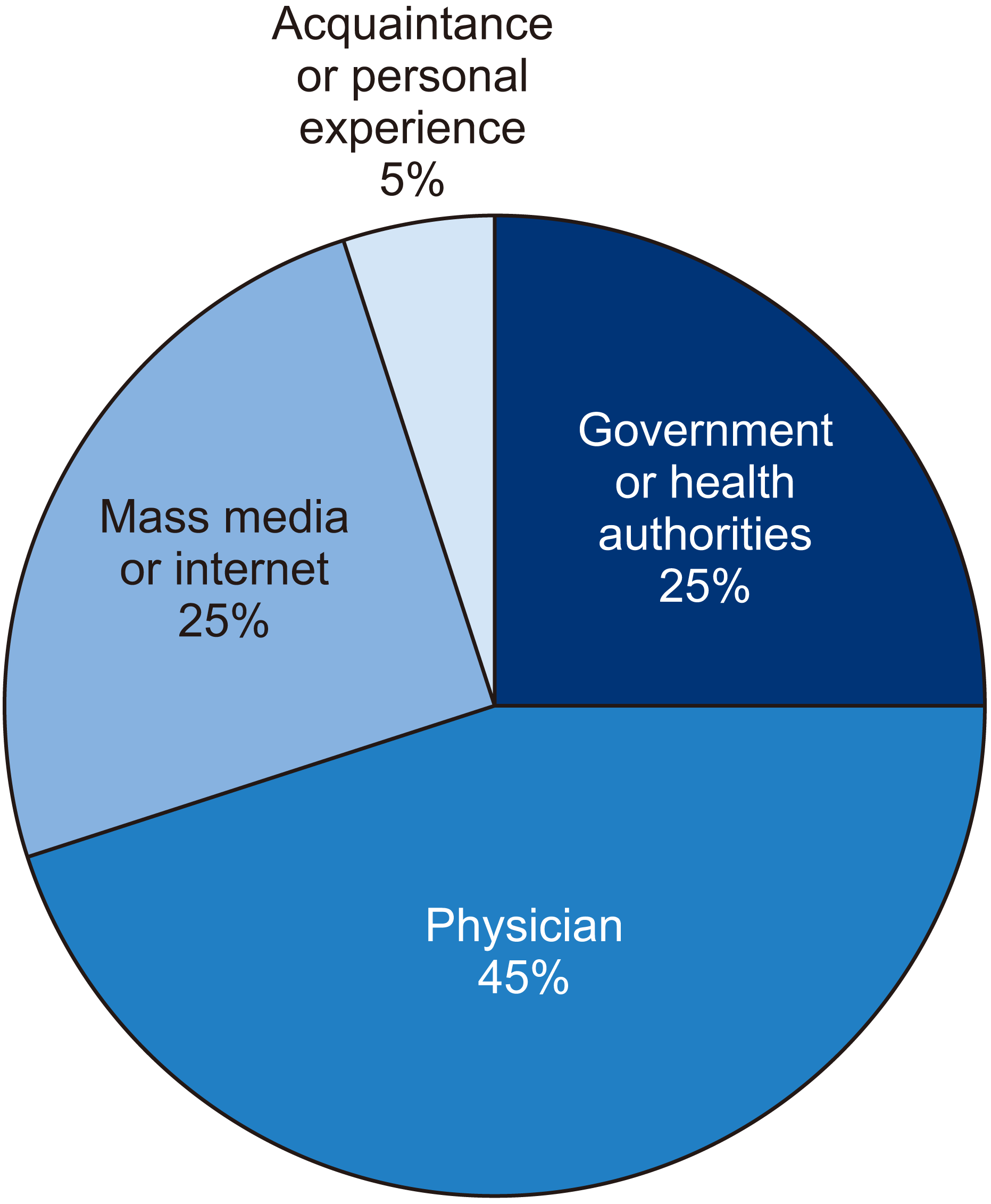On January 19, 2020, the first case of coronavirus disease-2019 (COVID-19) was identified in South Korea. The subsequent outbreak unfolded in a manner distinct from previous outbreaks like severe acute respiratory syndrome and Middle East respiratory syndrome (MERS). In the early stages, government countermeasures prioritized rigorous isolation protocols and epidemiological surveillance [1]. This approach eventually shifted towards the pursuit of herd immunity through systematic vaccination programs. Finally, as of August 31, 2023, the pathogen was reclassified as a Level 4 infectious agent, denoting the cessation of the COVID-19 pandemic. Challenges presented by the COVID-19 pandemic have accentuated the indispensable nature of patient education and counseling. This proved crucial not only in individual health management, but also in the successful implementation of government health policies.
The COVID-19 pandemic has profoundly affected individual health behaviors, particularly among patients with rheumatic diseases. Misinformation and fear, heightened by the MERS outbreak in medical facilities, led many to hesitate in seeking healthcare or discontinuing treatment. At the height of the pandemic in August 2021, we conducted a nationwide survey of 913 patients with rheumatic diseases to assess changes in their healthcare behaviors and opinions regarding vaccinations. Concurrently, we surveyed 122 rheumatologists regarding challenges in patient care during this period. Of the patients, 60.0% (548/913) believed that COVID-19 could seriously affect disease progression. Among the rheumatologists, 86.1% (105/122) reported that their patients either missed treatment or received adjusted medications without guidance. However, only 16.0% (146/913) of the specialists reported aggravated rheumatic disease due to COVID-19. A meta-analysis found that the use of disease-modifying antirheumatic drug or biologics lowers the risk of severe COVID-19 in patients with autoimmune diseases, implying their safety during the pandemic [2]. Given these insights, providing clear information and counseling is pivotal to addressing the concerns and misconceptions of patients with rheumatic disease regarding COVID-19.
Prior to the availability of vaccines, isolation and social distancing were integral to the COVID-19 mitigation efforts. However, as the pandemic progressed, these strategies inadvertently affected the physical activity of individuals with rheumatic conditions. Approximately 90% (820/913) of the patients indicated that they either did not exercise at all or that their daily exercise routine was significantly reduced compared with the pre-pandemic period. Nonetheless, they displayed keen interest in an educational program for exercising, with 58% (529/913) expressing their intention to actively participate in such a program. Regarding the exercise education program, a web-based platform utilizing YouTube or QR codes was preferred over traditional education methods, such as in-person group training or educational brochures (67% vs. 33%). This preference can be attributed to increased exposure to telemedicine or mobile apps for quarantine policies during the pandemic. These findings suggest that patient education via a web-based platform can facilitate the realization of an individualized education program, irrespective of circumstances, moving away from the standardized educational approaches of the past.
The ‘Corona-Blue’ phenomenon, a term coined from the combination of ‘coronavirus’ and ‘blue’ (indicating depression), describes the anxiety and lethargy stemming from prolonged social distancing and reduced income during the COVID-19 pandemic. Half the patients (465/913) experienced depressive symptoms, with 29.0% (265/913) feeling isolated and lonely. This crisis also exacerbated financial challenges; 16.0% (146/913) encountered increased medical expenses compared to pre-pandemic times. Notably, this strain was more prevalent among users of biologics (p<0.05). While the authorities provide mental health and financial support to vulnerable groups, many were unaware of these resources. As depicted in Figure 1, rheumatic patients sought more than just disease education; they also wanted information on medical welfare from their counseling. Hence, patient education should go beyond imparting knowledge to link patients to essential medical welfare services and potentially boost their satisfaction levels.
Doubts and mistrust about the safety of COVID-19 vaccines were the main barriers to their expansion. Sixty-four percent (584/913) of patients highlighted concerns about adverse events, whereas 17.0% (155/913) feared exacerbation of their autoimmune diseases due to vaccination. In response to this widespread uncertainty, the Korean College of Rheumatology took the lead in crafting guidelines for the vaccination of individuals with autoimmune conditions [3]. In our survey, the patients expressed higher trust in the vaccine information provided by their physicians than in government announcements or mass media, as depicted in Figure 2. Eighty-four percent (102/122) of rheumatologists concurred that patient education played a pivotal role in the successful implementation of national COVID-19 policies. Consequently, policymakers should actively support the educational outreach of physicians to reinforce the stable implementation of healthcare policies.
Despite the limited face-to-face interactions during the COVID-19 pandemic, 64.0% (584/913) of the patients expressed a preference for educational counseling from their physicians or trained nurses. However, both patients and doctors cited limited consultation time during outpatient visits as the primary challenge to educational counseling. In clinical practice, education and counseling have distinct yet essential roles alongside diagnosis and treatment. Despite their importance, Korea’s healthcare reimbursement system inadequately compensates for these services, relying on physicians’ altruism, and consequently diminishing their motivation. The COVID-19 pandemic has underscored the critical role of patient education and counseling in navigating unprecedented challenges. Even in the post-COVID-19 era, systematic and tailored education and counseling for rheumatic diseases by trained professionals are imperative. Government pricing should provide incentives for healthcare providers. Academic societies should take responsibility for overseeing professional training and ensuring the content quality.
REFERENCES
1. Dighe A, Cattarino L, Cuomo-Dannenburg G, Skarp J, Imai N, Bhatia S, et al. 2020; Response to COVID-19 in South Korea and implications for lifting stringent interventions. BMC Med. 18:321. DOI: 10.1186/s12916-020-01791-8. PMID: 33032601. PMCID: PMC7544529.

2. Akiyama S, Hamdeh S, Micic D, Sakuraba A. 2021; Prevalence and clinical outcomes of COVID-19 in patients with autoimmune diseases: a systematic review and meta-analysis. Ann Rheum Dis. 80:384–91. DOI: 10.1136/annrheumdis-2020-218946. PMID: 33051220.

3. Park JK, Lee EB, Shin K, Sung YK, Kim TH, Kwon SR, et al. Korean College of Rheumatology Task Force for COVID-19 Vaccine Guidance for Patients with Autoimmune Inflammatory Rheumatic Diseases. 2021; COVID-19 vaccination in patients with autoimmune inflammatory rheumatic diseases: clinical guidance of the Korean College of Rheumatology. J Korean Med Sci. 36:e95. Erratum in: J Korean Med Sci 2021;36:e270. DOI: 10.3346/jkms.2021.36.e95. PMID: 33783147. PMCID: PMC8007420.





 PDF
PDF Citation
Citation Print
Print





 XML Download
XML Download